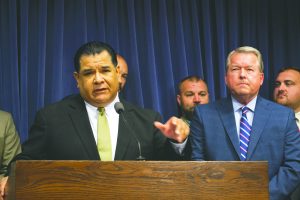Bipartisan group touts plan to raise $2.4 billion for Illinois infrastructure
By Jerry Nowicki Capitol News Illinois — May 11, 2019
State Sens. Martin Sandoval (D-Chicago) and Don DeWitte (R-St. Charles) speak in favor of an infrastructure plan to raise $2.4 billion for roads and bridges by increasing the state’s motor fuel tax and licensing fees. They were joined Wednesday at the Capitol in Springfield by a coalition of business, union, and transportation interests. (Photo by Jerry Nowicki/Capitol News Illinois)
SPRINGFIELD — A bipartisan coalition laid out a plan Wednesday that would raise $2.4 billion for road and bridge infrastructure improvements by hiking the state’s gas tax and a series of license fees.
State Sens. Martin A. Sandoval (D-Chicago) and Don DeWitte (R-St. Charles) were joined by leaders from commerce, organized labor and the construction industry as they advocated for a 25-cent increase to the state’s gasoline tax, which they say is needed to address years of neglect.
“We all agree and know that our state’s infrastructure needs improvements through strategic, sustained, bold leadership and efficient planning,” Sandoval said. “We haven’t had a capital bill in 10 years. It’s time to modernize our transportation funding formula to make it sustainable and consistent.”
Sandoval is sponsoring House Bill 3233, which would provide $2.4 billion in funding through increases to Illinois’ motor fuel tax, vehicle registration fees, driver licensing fees and title certificate fees.
While DeWitte spoke in favor of a gas tax increase, he said he would advocate for a removal of the sales tax the state levies on motor fuel. Thanks to a 2016 “lock box” amendment to the Illinois Constitution, motor fuel taxes are mandated for use on road and bridge safety, while sales taxes are not.
DeWitte said he had not yet signed on as a co-sponsor to Sandoval’s bill because it does not repeal the sales tax, but he said he supports the premise.
“These funding increases currently being debated in this Legislature will provide a steady stream of funding for years to come,” DeWitte said. “And they’re guaranteed, most importantly for taxpayers, they are guaranteed to go where promised as they are strictly dedicated to transportation-related issues.”
The bill calls for raising the motor fuel tax from 19 cents to 44 cents, which would generate an estimated $1.2 billion in revenue. The bill would also hike the tax on special fuels, which includes diesel and biodiesel, from 21.5 cents to 52 cents, bringing in an estimated $478 million. Those increases would be indexed to increase with the rate of inflation.
Sandoval said the motor fuel tax has not increased in Illinois since 1990, while 29 states have increased their fuel taxes since 2012.
Vehicle registration fees would go up as well, with passenger vehicles and class B trucks increasing to $148 from $98 and electric vehicles seeing a major spike to $1,000 from $17.50. Those rates would be indexed for inflation as well and would generate approximately $458 million in revenue.
Other truck registration fees would all increase by $100, raising about $30 million. Driver’s license fees would all double as part of the plan as well, going from $30 to $60 for the original license in most cases. Certificates of title would increase from $95 to $155.
The bill also repeals a Commercial Distribution Fee on trucks and allows municipalities to impose a 3-cent motor fuel tax of their own if they also adopt an approved responsible bid ordinance.
RELATED: Education, health care, union representatives seek infrastructure funds
Coalition seeks $1 billion for water infrastructure program
The Illinois Chamber of Commerce said it supports a different gas tax hike, House Bill 3823, which includes a provision to phase out the sales tax on motor fuel.
“While we don’t take tax increases lightly, investing in our transportation system will help Illinois drivers who pay about $600 every year in increased maintenance costs due to major wear and tear on their vehicles from the poor condition of Illinois roads and bridges,” Chamber President and CEO Todd Maisch said in a statement.
The Illinois Petroleum Marketers Association and the Illinois Association of Convenience Stores issued a release opposing any increase to the gas tax, saying it would put stores on the state border at a disadvantage.
“Store owners as well as state and local governments will lose 8 to 10 percent of much-needed revenue, including revenue from products purchased other than gas, such as tobacco, food and beverages,” Bill Fleischli, executive vice president, IPMA-IACS, said in a statement.
Jnowicki@capitolnewsillinois.com







